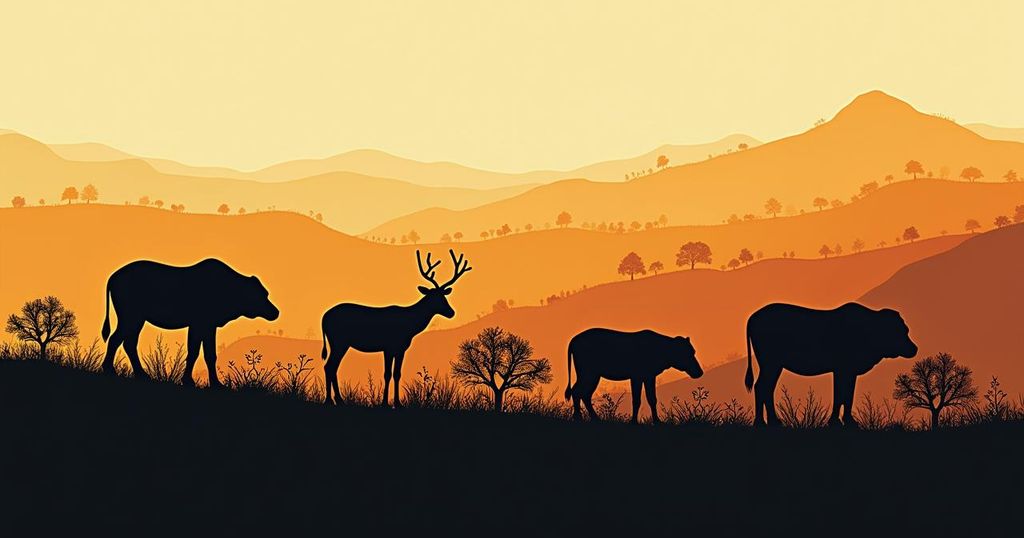South Africa’s wine industry, pivotal to the economy, is facing crucial threats due to climate change, particularly from rising temperatures, erratic rainfall, and increased pest prevalence, all of which jeopardize the quality and yield of grape production. Measures to mitigate these impacts must be implemented urgently to protect both livelihoods and the industry’s future.
The wine industry in South Africa, renowned for its quality and global standing, faces significant threats from climate change. In 2023, the nation produced 934 million litres of wine, exporting 306 million litres and generating around R10 billion. This sector supports numerous jobs and plays a vital role in tourism, serving as a source of national pride and economic contribution. However, the intensifying effects of climate change are jeopardizing agricultural output and the livelihoods associated with it. Climate change, defined primarily as an increase in global temperatures due to rising carbon dioxide levels in the atmosphere, carries complex repercussions for viticulture. Although increased temperatures may seemingly benefit grape crops, research indicates that they also lead to earlier grape ripening, with harvests now occurring two to three weeks sooner than they did four decades ago. This alteration disrupts seasonal labour patterns, particularly affecting migrant workers who contribute substantially to vineyard labour. Moreover, climate change is anticipated to result in erratic rainfall, leading to a rise in droughts and floods. Such instability not only threatens yields and may cause crop losses but also disrupts the predictability essential for farmers’ planning. Grapes, being particularly sensitive to environmental shifts, are vulnerable; even slight variations in flavor can significantly impact a wine’s marketability. Increased temperatures also foster the proliferation of pests and diseases, such as the bacterium Xylella fastidiosa, which has been exacerbated by climate conditions, thus affecting grapevines. In 2022, farm workers in Paarl protested against the use of hazardous pesticides, an issue likely to worsen due to escalating pest activity that necessitates increased pesticide applications, undermining prior attempts for more sustainable practices. Furthermore, elevated temperatures result in increased sugar content in grapes. Research demonstrates that for each 1°C rise, grapes may gain approximately 12 grams of sugar per litre, potentially elevating alcohol levels by 0.66%, which may challenge the delicate balance of wine flavor as higher alcohol content tends to overshadow subtler notes. To address rising alcohol levels, winemakers might employ methods such as ‘watering back’—adding water during fermentation, which can affect flavor intensity—or early harvesting of grapes, which paradoxically can further complicate the issues associated with early ripening. Utilizing yeast strains with lower ethanol tolerance could provide greater control without sacrificing quality, although this would result in higher residual sugar. In summary, the ramifications of climate change on South Africa’s wine industry are extensive and serious. The consequences affect not only those whose livelihoods are intertwined with winemaking but also those impacted by agricultural practices related to the sector. Ultimately, climate change could leave a decidedly bitter aftermath that challenges the very essence of South African wines.
The South African wine industry is recognized both domestically and internationally for its exceptional quality, thriving under conditions that have historically favored grape cultivation. However, as climate change accelerates, the sector faces disruptions that threaten not only wine production but also the economic foundation it provides. Climate change involves complex interactions between shifting temperature patterns, rainfall variability, pest proliferation, and ecological dynamics, all of which compound the challenges faced by vineyard operations and the workforce dependent on this industry.
The climate crisis poses multidimensional threats to South Africa’s wine industry, affecting grape ripeness, yield consistency, pest management, and wine quality. These challenges implicate broader socioeconomic consequences for agricultural workers and contribute negatively to the sector’s resilience. The need for adaptation strategies has never been more urgent as the industry seeks to navigate the complex impacts of climate change while maintaining its esteemed reputation.
Original Source: www.dailymaverick.co.za






